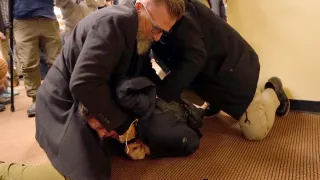July 1, 2017
SF Homeless Project: Few in Castro Program Use Reserved Shelter Beds
Matthew S. Bajko READ TIME: 3 MIN.
Over the past 33 months members of San Francisco's Homeless Outreach Team have routinely been engaging with homeless individuals in the Castro district to offer them a wide array of services. It can be as simple as handing out a free pair of clean socks to more involved assistance such as medical care or locating a place to stay for the night.
Known as Castro Cares, the initiative launched in the fall of 2014. It is a joint effort by the Castro/Upper Market Community Benefit District and a number of other Castro-based neighborhood groups. Between September 2014 and April of this year, the most recent month for which data has been released, the outreach workers have encountered 4,154 people as they made their rounds through the city's gayborhood.
An overwhelming majority, 63.5 percent, has engaged with the HOT members. One offer of assistance the outreach workers can usually make is to reserve a person a bed at a shelter for the night. (On 23 occasions as of the end of April, a reservation could not be made due to there not being a bed available.)
As the Bay Area Reporter noted in a December story about the program, a significant number of the people living on the streets that the HOT members encounter agree to be referred to one of the city's homeless shelters for the night. Through the end of April a shelter reservation had been made for 480 people, or 18.2 percent of those who engaged with the outreach team.
But according to the most recent Castro Cares encounter report, just a fraction of those individuals, 20, had utilized their shelter reservations. In most cases, the individual is required to arrange their own transport to the shelter later that day.
"Shelter bed referral does mean that a reservation is actually made and it is guaranteed, but only the most frail get driven to the shelter," noted CBD Executive Director Andrea Aiello, adding that even if a reservation is made "the individual may decide not to go."
Aiello told the B.A.R. she believes a main reason for why so few people make use of their shelter reservation is because they are not provided with transport to the shelters. It is an issue she has discussed with the city's Department of Homelessness and Supportive Housing, "because I think it is better to actually take them there if a reservation is made ... no matter what their ambulatory status is. ... this has not been HOT's policy... but as you can see, something on the city's end is not working."
This spring, during an editorial board meeting with the B.A.R., the director of the city department, Jeff Kositsky, said he doesn't have the funds to provide such transport.
"We have a limited amount of resources and we deploy them where we can," said Kositsky. "We do have a contract for therapeutic transport but it has limited availability."
On Monday Kositsky's department released its first progress report and disclosed it would issue a strategic framework in August "outlining a radical transformation of the Homelessness Response System and clearly defined, obtainable goals for the next five years."
The department has also been working with the city controller's office on restructuring the Homeless Outreach Team. Randy Quezada, a spokesman for the homeless department, said Tuesday it has heard from the community of the need for better transit services.
"The resource issue is real for what the HOT team does, whether it is through Castro Cares or another program. Right now it is not equipped to do wide scale transport," said Quezada.






